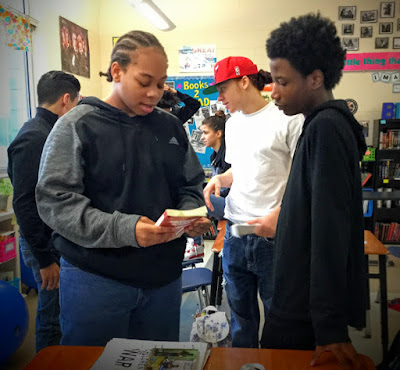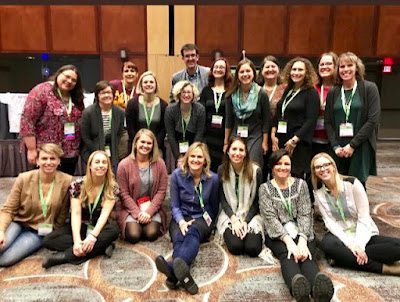What Do Kids Talk About If They're Not Reading The Same Book?
 |
| Stand Up-Hand Up-Pair Up at work |
My classroom has independent reading as it's foundation. We read every single day, no questions asked. So, what then do kids have to talk about? Don't they have to be reading the same text to have meaningful conversations?
My students actually have a lot to talk about. They also have a lot of individual responsibility in each conversation. They aren't in conversations to ride on anyone's coat tails; they're there to share coherently and to learn from others.
Book Groups
This year I put my students into book groups in October. The groups of 3-4 students are consistent; they'll stay the same all year long. Students meet with their groups every other week. The structure is also consistent: the topic is based on what we're learning about at the time (characters, plot, setting, influence of any of these on each other, theme, strategies, etc.). Students begin by writing a reflection on their books and thinking in the reading section of our Writer's Notebook. This reflection helps them pull together the elements of their book that they are going to share with the group. When the group gets together, each member shares either his/her reflection or just talks about the topic based on the reflection. Group members listen to the speaker and are required to ask at least two follow up questions a piece.
When the groups began, they were robotic. Students would read their reflections, and two mechanical questions would come out of their partners' mouths. Conversations felt forced and artificial. But they have improved tremendously over time. I walk around my classroom with my clipboard jotting quick notes on what is happening. What's going well? What needs improvement? At the beginning, I shared a lot. "I noticed that Timothy carefully planned what he'd share about how his main character's inner voice is developed," and "I liked how Emily asked Taryn to explain more when she was confused." As time has gone by, however, my students have taken over this reflection. They talk as small groups about what went well and what they struggled with, and then we share as a whole class - helping each other by offering suggestions about how to make the groups function better. The conversations now feel like genuine sharing and genuine curiosity. The bonds formed in these groups have helped our class a lot; the kids are comfortable with each other; they encourage and help each other; and they hold each other accountable. These authentic conversations have helped our culture grow from individuals who read into a community of readers.
Gone are the days of conversations filled with some students passively listening to others interpret the reading for them. When we read and discussed whole-class texts, I would inevitably have some students more involved than others. Some had read, thought deeply about the text, and came prepared to discuss it. Others knew they could gain a lot just by listening and so they did not read or think about it at all. And when I tried those gotcha quizzes to make sure everyone was reading, it just promoted a culture of distrust, separation, and reading as a chore. Now conversations are filled with active participants. Each student is accountable for reading, thinking and sharing because they are the owners of the knowledge in their books. They are the experts.
Partner Sharing
My students also get up out of their seats and share informally often. Our favorite right now is doing a Stand Up-Hand Up-Pair Up. I ask students to get up and find a partner to share with. Depending on the day, I might say, "Share the title of your book and one thing you love about it" or "Share the title of your book and one thing you think the author should have done differently." When the first partnership ends, they put their hands in the air signaling they are ready for new partners. I typically have them each share with three different partners. The kids love these informal shares - quick information giving and getting. As we finish, I remind them every time, "If you heard a book you liked, make sure you add the title to your Books I Might Read lists."
Book Talks
I'm going to admit that this area is more of a plan right now than a reality. At the beginning of class first semester and well into second semester, class started with a daily book talk or a trailer by me. I talked books, sold books, pushed books, and encouraged readers to pick them up. My goal was to hand this over to students right away second semester, but I wasn't ready. It was totally a control thing; I'll admit that right away. Students just aren't as good at doing book talks as I am, and I was terrified that this whole independent reading thing would fall apart without me playing captain of the ship, master of the universe. I'm cringing now, even as I type this, but I'm all about honesty here. The goal is to do what Kelly Gallagher wrote about in In the Best Interest of Students where he has his kids take over and share a book minute at the beginning of class. They learn how to share in an effective, concise way. Turning Book Talks over to students is a goal, not a reality yet for me. But goals made public get achieved right?
*****
The talk in my classroom about individual books has been rich this year. Students are passionate to tell others about their books, to share their thinking, and to explore how they really feel about a book. With whole-class text, ownership and real thought were buried because I, the teacher, chose the book: Of course it's great literature. Guess we have to figure out what she already knows. Now we are free of that. If students want to explain why their books are not great literature or do not meet the topic of the day, they can because it hasn't been pre-determined. Through this process of authentically evaluating books, students are learning so much. They are actually analyzing, synthesizing, and evaluating books for themselves. And, ultimately, isn't that what we want - real thinkers and critics with authentic voices?



Comments
Post a Comment